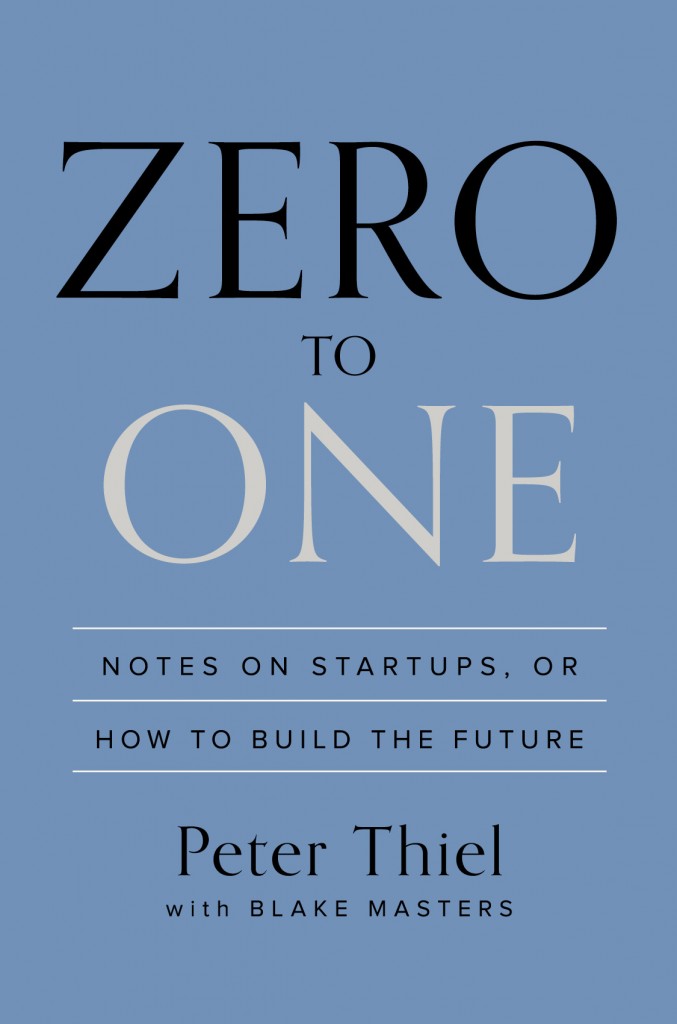 Zero to One by Peter Thiel is a book written for the startup entrepreneur. It’s about innovation and thinking right about the future, about business and success. The title comes from the idea of vertical and horizontal progress. Horizontal, or “extensive”, progress is essentially copying and incrementally improving upon things that already exist. A frying pan with a clock radio is obviously a better product. Vertical progress is the idea of going from ‘0 to 1’. Creating something fundamentally new. It’s aptly named.
Zero to One by Peter Thiel is a book written for the startup entrepreneur. It’s about innovation and thinking right about the future, about business and success. The title comes from the idea of vertical and horizontal progress. Horizontal, or “extensive”, progress is essentially copying and incrementally improving upon things that already exist. A frying pan with a clock radio is obviously a better product. Vertical progress is the idea of going from ‘0 to 1’. Creating something fundamentally new. It’s aptly named.
Thiel is a serial entrepreneur, a hedge fund manager and venture capitalist. He cofounded Paypal and a company called Palantir, which specializes in data analysis for the government. This is a guy who knows his stuff, or at the very least, he has a perspective worth listening to.
A Confounding Truth
I found something very interesting in the early pages of this book. The very first sentences in the preface say: “The next Bill Gates will not build an operating system. The next Larry Page or Sergey Brin won’t make a search engine. And the next Mark Zuckerberg won’t create a social network. If you are copying these guys, you aren’t learning from them.” That seems evident enough–these are people that did the vertical progress thing. Whoever is doing the vertical progress thing right now is probably happily using Facebook already and doesn’t see a need to reinvent it.
The other thing is that Thiel was going to Stanford, working on Paypal 19 years ago. The zero to one jumps that Thiel has made in his lifetime, and which give him credibility to write this book, were being prepared over 19 years ago.
Thiel believes that people are stuck in their idea of what the world looks like today. Few people even understand the idea of innovation. Innovation for most people is simply clever iteration. But truthfully, the world will continue changing. The personal computer made a big difference. The internet made a big difference. The smartphone made a big difference. The next thing that makes a big difference might not be so easy to spot until we’re in the midst of it. But that’s what innovation–going from zero-to-one–is about. Trying to guess what the next thing to make a difference will be, and doing it.
Not all monopolies are bad
Thiel is not a fan of competition. It’s something I struggled with while reading, but eventually came to see his point. My opinion is still up for grabs. The idea is that competition strangles profits, obviously. But profits are also what allow a company to continue to innovate. Thiel would say that there’s a difference between having an entire market and strangling an entire market. There’s a difference between the monopolies in Thiel’s view, and the monopolies we’re likely to hear about on the news–such as the TWC / Comcast merger. Good monopolies have some kind of proprietary offering–something that is uniquely theirs, which could only be copied fraudulently. They have network effects, meaning the product has a tendency to become more and more useful as more people use it. They have access to economies of scale. And, they have a strong brand. And most importantly almost everyone is happy to use them.
In effect, Google is pretty close to being a search monopoly. However, they’re incentivized by the potential for competition to continue innovating. The monopoly-like profits give them the resources to do so. Not too many people are complaining. Thiel sees this as the goal of any truly innovating startup: Achieve monopoly status, at whatever scale.
In the book
The book is a mix of recent history, commentary, principles, and some light practical application.
Thiel takes time to talk about market timing, luck and hard work. He covers company culture and finances. He goes through singleness-of-mind and what’s in a good start up team. He talks about the importance of sales and reminds us that we only hate bad salespeople. We just can’t identify the good ones–they’re invisible.
Thiel’s concepts are not grand or hard to grasp, but they are sometimes contrary to popular opinion and belief. I found his rebuttal of Malcolm Gladwell’s Outliers, in Chapter six, to be very insightful. Similar to Twyla Tharp in Creativity Habit where she says you have to “plan for luck”, and the lottery motto “you have to play to win”, Thiel would say we have to be ready for opportunity–be who we need to be, where we need to be, doing what we need to do. If it works out, we’re lucky.
The chapters in the book are short and fairly succinct. Each chapter cost me about 15 minutes at a good pace. If you’re running a business, or working for a startup, it’s worth the read.

Recent Discussion